¶ 1 Leave a comment on paragraph 1 0 Welcome. Please read the instructions for reviewing before commenting. We ask contributors to be generous when thinking along with our pieces and to keep in mind that the final chapters are intended to be short essays. Visit matteringpress.org for more information on its other books. Readers might also want to have a look at this resource created by one of the book’s editors, Emily Yates-Doerr, which catalogues key Open Access anthropology publications.
¶ 2 Leave a comment on paragraph 2 0 By Ruth Goldstein
¶ 3 Leave a comment on paragraph 3 0 “Is writing seemly? Does the writer cut a respectable figure? Is it proper to write? Is it done?”
– Jacques Derrida, “Plato’s Pharmacy” in Disseminations
¶ 5 Leave a comment on paragraph 5 0
¶ 6 Leave a comment on paragraph 6 0 “I choose… Estrella. Yes, you can call me Estrella when you write.”
¶ 7 Leave a comment on paragraph 7 0 “Are you sure?” I asked.
¶ 8 Leave a comment on paragraph 8 0 Estrella nodded her head, a wisp of dyed honey-blonde hair coming loose from behind her ear. Her long earrings, the gold paint flaking around a plastic ruby, swayed back and forth as she nodded in affirmation. Yes, she was sure.
¶ 9 Leave a comment on paragraph 9 0 “You can write if you want,” Estrella gestures to my notebook that sits on the table. I write instead on a napkin. It feels less official and thus less obtrusive. “Unless you prefer napkins… This is what you call anthropology?” She laughs and pats my hand, pen frozen on the flimsy paper.
¶ 10 Leave a comment on paragraph 10 0 I look at my scrawl on the napkin. I have written the date, her chosen pseudonym, and the location of the café where we sit. “Yes,” I tell her. This is what I call my anthropological practice of ethnography. I bring out my field notebook, already swollen with the additions of drawings and pressed plants that women have given me. The drawings are the result of trying to keep sex-workers’ children occupied while I talk with their mothers, which at times becomes a baby-sitting arrangement if a client interrupts our conversation. Estrella leafs through these. She has several children of her own, but they live with her mother in another part of Peru. That childhood home is far from her adopted one, which is a place of work in the prostíbars (brothels) of the Peruvian Amazon’s region of Madre de Dios (Mother of God).
¶ 11 Leave a comment on paragraph 11 1 “Do you always ask people what name they want to use?” She wanted to know.
¶ 12 Leave a comment on paragraph 12 0 “Yes.”
¶ 13 Leave a comment on paragraph 13 1 At the time of this initial dialogue with Estrella in 2011, this was true. But ideas and ethnographic practices change with the dynamism of everyday life. I offer this participatory process of “choosing names” as an ethnographic case, one way that ethnographers can serve to further the trust of people whose lives and stories we analyze. My fieldwork, which had begun in 2010, examined three modes of “traffic”: in women destined for the sex-trade, plants studied by pharmaceutical companies for reproductive health, and gold, made solid via liquid mercury along Latin America’s Interoceanic Road. I traveled the 3500-mile road from the Brazilian Atlantic to the Peruvian Pacific coast, traversing the Brazilian, Peruvian, and Bolivian Amazon. From rainforest to laboratory, from brothel to bank, “traffic” functioned as my analytic to examine physical encounters and collisions as well as entwined questions of the dynamic value of people and things traveling across borders and through global commodity-chains.
¶ 14
Leave a comment on paragraph 14 0
 “Welcome” sign over the start of the South leg of the Interoceanic Road, from Cusco all the way to São Paulo in Brazil. (Photo taken by the author)
“Welcome” sign over the start of the South leg of the Interoceanic Road, from Cusco all the way to São Paulo in Brazil. (Photo taken by the author)
¶ 15
Leave a comment on paragraph 15 0
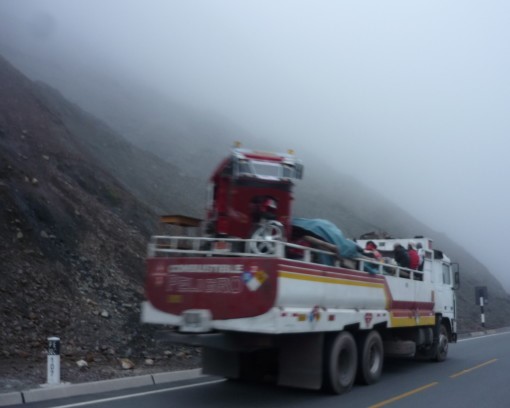 Traffic(king) of People and Things along the Interoceanic Road. (Photo taken by the author)
Traffic(king) of People and Things along the Interoceanic Road. (Photo taken by the author)
¶ 16
Leave a comment on paragraph 16 0
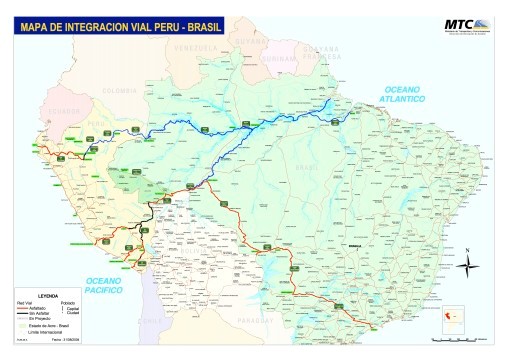 Map of Road Integration, Peru-Brazil. (Peruvian Ministry of Transportation and Communication)
Map of Road Integration, Peru-Brazil. (Peruvian Ministry of Transportation and Communication)
¶ 17 Leave a comment on paragraph 17 0 The gold mining, which fueled interdependent economies, had its greatest concentration in Madre de Dios where I first met Estrella. Situated near the borders of Brazil and Bolivia, Madre de Dios had earned the nickname “El Wild Wild West” for the implosion of lawlessness and prostitution reminiscent of the North American gold rush. The fall of the U.S. dollar and the rise of the price of gold had coincided with the construction of the Interoceanic Road, which was the first paved thoroughfare in the region (marked in black on the above map). Where artisanal mining had previously meant backbreaking work for little return, the price was now right for a livable wage. Male miners from Brazil, Bolivia, and Peru streamed into the rainforest mines. Female sex-workers hailed from these countries, in addition to Colombia and Ecuador. During my two years conducting research along the Interoceanic Road (2010-2012), I would ask miners and sex-workers, along with environmental engineers, biologists, indigenous leaders, and government officials, what name they would like me to use when I wrote.
¶ 18 Leave a comment on paragraph 18 1 Government officials almost entirely chose their own names for accounts written about them. Sex-workers already operated under a host of fake names to protect themselves and their families from embarrassment and, in some cases, violence from clients and police (who were often one-and-the-same). Miners similarly conducted their operations illicitly. They did not employ their legal names (if they had a national identity card from Peru or a neighboring country) – not among one another in the mines, not with the environmental engineers who tried in vain to regulate the proliferating artisanal application of liquid mercury in the mines, and certainly not with me. I asked people how they would like to be “named” because people’s words have a different quality when their narratives become legible as a creative process and practice of co-authorship.
¶ 19
Leave a comment on paragraph 19 0
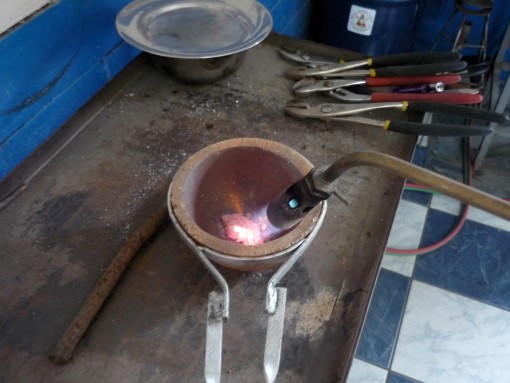 Gold “changing” — burning the mercury to leave pure gold; a highly toxic procedure. (Photo taken by author)
Gold “changing” — burning the mercury to leave pure gold; a highly toxic procedure. (Photo taken by author)
¶ 20
Leave a comment on paragraph 20 0
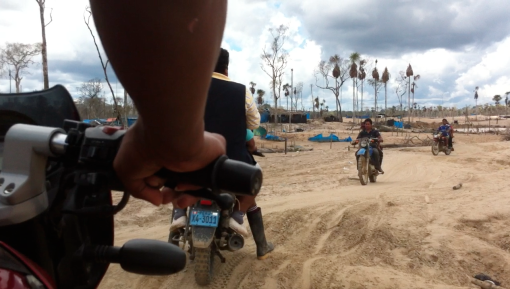 Transport in the gold mines. Mercury turns the rainforest landscape into a desert. (Photo taken by the author).
Transport in the gold mines. Mercury turns the rainforest landscape into a desert. (Photo taken by the author).
¶ 21
Leave a comment on paragraph 21 0
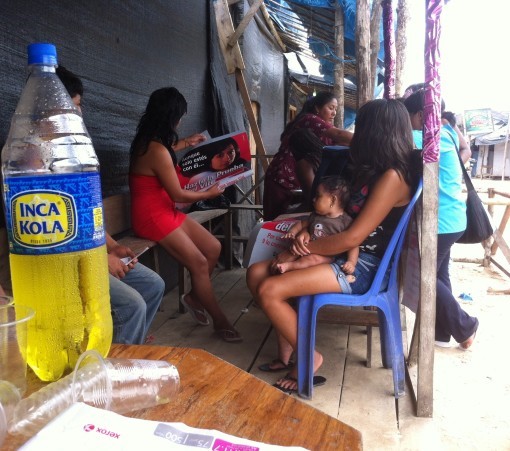 Regional Peruvian health team performing rapid HIV/AIDS tests anonymously for sex-workers and gold miners in rainforest mining camps, pictured here outside of a brothel. (Photo taken by the author)
Regional Peruvian health team performing rapid HIV/AIDS tests anonymously for sex-workers and gold miners in rainforest mining camps, pictured here outside of a brothel. (Photo taken by the author)
¶ 22 Leave a comment on paragraph 22 2 Despite my desire to make my ethnographic fieldwork as interactive as possible, I soon realized that I could not always uphold a practice of inviting people to choose without any intervention on my part. As I became more ensconced in fieldwork, I realized the high stakes in employing people’s legal names, even if they wanted me to do so. When it came to writing about indigenous activists, I did not always feel comfortable honoring a person’s request to employ their full and legal names. Gaining one’s identity card and displaying nametags has become a proud gesture for people – indigenous or not (and that category of the person also goes up for debate) – so often ignored by the State. This process echoes Marcel Mauss’s notion that having a name forms a critical step in taking on an identity as a person (Mauss 1985). Yet while indigenous activists may have felt confident in their personhood and in asking me to use their full names, environmental activists, particularly indigenous ones, represent easy assassination targets for disgruntled loggers, oil speculators, miners, and drug traffickers. Naming people in full might not only undermine their efforts, it might also put their lives in danger.
¶ 23 Leave a comment on paragraph 23 2 Sex-workers, unlike indigenous activists, did not tell me their real names and I did not ask for them, knowing that they protected their own identities from their customers as well. I may never have learned Estrella’s real name had a competing exotic dancer not stolen it. “Véronica” became the first person that selected a pseudonym that I refused to employ on ethical grounds. Véronica knew Estrella’s full legal name and had taken it to represent her exotic dancing persona. This meant that she exposed Estrella to social harassment at best and to police violence at worst. Most worrisome for Estrella, however, was that in the event of a police raid, the news media – armed with video cameras – would take footage and reveal her identity. Family members did not know about her line of work, and Estrella feared that they would find out. She hid under the beams of police searchlights and news cameras as best she could. It was she who pointed out to me some of the similarities and differences between sex-workers and indigenous activists. “We are both trying to stay alive. The government needs us but also hates us. They will stand and show face, but we do not.” Estrella’s comment that the government both needed and hated sex-workers and indigenous activists came from her observation that both were necessary for a strong tourist industry. But both were too often found floating dead downriver.
¶ 24 Leave a comment on paragraph 24 5 In November 2014, just as Peru prepared to hold climate talks in Lima, four indigenous activists died when illegal loggers attacked them. Death threats had become a common way of life for activists and leaders at the indigenous federation of Madre de Dios (Federación Nativa del Rio Madre de Dios y sus Afluents – FENAMAD). Hunt Oil, the powerful petroleum conglomerate, began its drilling in 2006. It’s not clear whether the Peruvian army, police officers, company cronies, or all of them together physically attacked protesting indigenous groups. The Peruvian government renewed the nine-year contract with Hunt Oil for another three years, without consultation with the indigenous communities living on the land under extraction (FENAMAD). With oil and gold ever more extractable, and with growing infrastructure, people and information traveled faster than they had along rivers when I first arrived in 2010. I now constantly question how quickly – or slowly – my own words and naming practices might also travel.
¶ 25
Leave a comment on paragraph 25 0
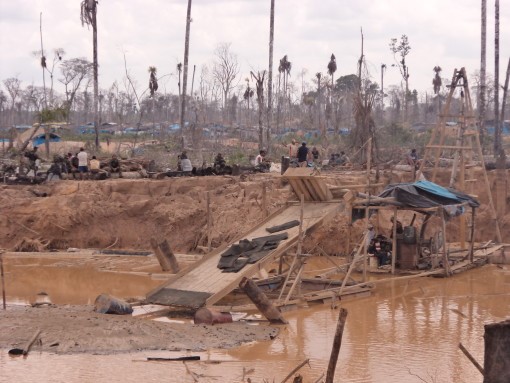 Peruvian Army extracting illegal gold miners from a rainforest conservation area. (Photo used with permission of Peruvian environmental engineers)
Peruvian Army extracting illegal gold miners from a rainforest conservation area. (Photo used with permission of Peruvian environmental engineers)
¶ 26 Leave a comment on paragraph 26 0 This might not have been a necessary concern had my fieldwork not come to an abrupt and undesired end in March of 2012 when a gold mining strike in Madre de Dios turned bloody. The Peruvian government sent its army to pacify protesting miners, joined by the indigenous federation of Madre de Dios. An estimated 15,000 gold miners went on strike to continue working, demanding an alleviation of environmental regulations. Several thousand sex-workers joined them. The indigenous federation, misjudging the political climate, walked with the gold miners in hopes of entering negotiations with the State over land claims. The plan backfired. The Peruvian media painted the indigenous federation as betraying the earth by making an alliance with the gold miners. Already targets if they did not cooperate with marauding loggers and miners, Amazonian activists once again became the focus of the Peruvian government’s “extraction” efforts (large-scale protests in 2009 along the InterAmazonian Highway had also turned bloody). The choice of the word “extraction,” as Peruvian secret servicemen explained to me while asking me to provide names and information to help them, was a euphemism for “extermination.”
¶ 27 Leave a comment on paragraph 27 0 Forced to leave and worried that I would endanger people who had trusted me with their words, I set about destroying identifying data. Without a strong Internet connection to digitally save interviews, everything went onto a small external hard-drive. This ended up pressed between my skin and the elastic of my clothing. I jammed the RAM on my computer so that it would not turn on anymore. I explained to the government agents going through my bags that the rainforest humidity, former ethnographic foe-turned-friend, had destroyed my digitized data.
¶ 29 Leave a comment on paragraph 29 1 The theoretical ground as well as the lived terrain surrounding Goffman’s use of anonymity has incited continuing debates that dance around the issue of race. While I find the critiques from journalists on this question of fact-checking easily addressable, the dynamics and ethics of race, and of what it means for a white social scientist to do an ethnography in/of an African-American community, merit further thought. Whether one agrees or not with Goffman’s fieldwork location and subsequent analysis, I do advocate for the care that she took to blur details, places, and events. She gave pseudonyms to protect – which I gather was also done out of respect – for the people who shared their lives with her.
¶ 30 Leave a comment on paragraph 30 1 These swirling debates around Goffman have given me pause to reflect on Derrida’s questions that I pose at the beginning of this piece. “Is writing seemly? Does the writer cut a respectable figure? Is it proper to write? Is it done?” I brought these questions with me into (and out of) the field because they not only urge me to consider my whiteness and privilege when I write, but also how I write. The attempt to collaborate in the choosing of pseudonyms is one way that I attempt to answer the questions of what it means for the writer to cut a respectable figure when analyzing the lives of others. Paulo Freire, Brazil’s revolutionary thinker and writer, espoused a pedagogy that was a “naming” of the world, engaging in a dialogue with others. “If it is in speaking their word that people, by naming the world, transform it, dialogue imposes itself as the way by which they achieve significance as human beings” (Freire 1970: 88). This resonates with Mauss’s assertion that to become a person, one must first have a name. Freire’s formulation, however, goes one step further in highlighting (as he does throughout Pedagogy of the Oppressed) human relationality, how we bring one another into existence through naming practices. For Franz Fanon, being called a name other than one’s own creates a severe sense of trauma and alienation from one’s self (Fanon 1967).
¶ 31 Leave a comment on paragraph 31 1 This is why inviting people to participate in their pseudo-naming, and telling them why I may not be able to honor their requests, meant something more important than “fact-checking.” It meant explaining to Véronica, who had stolen Estrella’s true name for her nightly activities, why I would not do as she wished. This did not provoke a positive response from Véronica, but it did mean that trust with Estrella and her network of sex-workers deepened. This in turn enriched my connections with them. Mauss’s concluding words, after considering whether the stable category of the person and naming might someday fade away, brings my own ethnographic case to a close: “Let us labor to demonstrate how we must become aware of ourselves, in order to perfect our thought and to express it better” (Mauss 1985: 23). That strikes me as a seemly and respectable answer to my own questions of how writing might be done.
¶ 32 Leave a comment on paragraph 32 1 This piece is dedicated to Estrella as well as Juana and Jorge Payaba Cachique, two indigenous Shipobo activists in Madre de Dios, Peru. Jorge passed away in November of 2014. His sister, Juana, fights illegal loggers and gold miners on Shipibo community land while facing death threats. She continues her brother’s work, advocating for the protection of “los pueblos indígenas en aislamiento voluntario” – “indigenous communities living in voluntary isolation” who live along the Peruvian and Brazilian border.
¶ 33 Leave a comment on paragraph 33 0 Ruth Goldstein is a medical anthropologist working at the intersections of environmental racism and queer theory. She currently serves as Head Tutor and Lecturer in the Folklore and Mythology program at Harvard University. Her research stems from nearly two decades of examining reproductive health, natural resource extraction, and gender-based violence.
¶ 34 Leave a comment on paragraph 34 0 References
¶ 35 Leave a comment on paragraph 35 0 Derrida, Jacques. Disseminations. Barbara Johnson, trans. New York: Athlone Press, 1981, p. 74.
¶ 36 Leave a comment on paragraph 36 0 Fanon, Franz. Black Skin, White Masks. New York: Grove Press, 1967 [1952].
¶ 37 Leave a comment on paragraph 37 0 FENEMAD. Gobierno amplía por tres años contrato de licencia a Hunt Oil para explorar Lote 76, Noticias Fenamad, August 5, 2015.
¶ 38 Leave a comment on paragraph 38 0 Freire, Paulo. Pedagogy of the Oppressed. Myra Bergman Ramos, trans. New York and London: Bloomsbury Academic, 2000 [1970].
¶ 39 Leave a comment on paragraph 39 0 Mauss, Marcel. “A category of the human mind: the notion of person; the notion of self.” Translated by W.D. Halls. In The Category of the Person: Anthropology, Philosophy, History. Edited by M. Carrithers, S. Collins, and S. Lukes, pp: 1-23. Cambridge; New York: Cambridge University Press, 1985.
¶ 40 Leave a comment on paragraph 40 0 Stoller, Paul. “Alice Goffman and the Future of Ethnography.” Huffington Post, June 15, 2015.
¶ 41 Leave a comment on paragraph 41 0 Stoller, Paul. “In Defense of Ethnography.” Huffington Post, August 24, 2015.
¶ 42 Leave a comment on paragraph 42 0 Watts, Jonathan. “Spotlight on murders of activists as Peru prepares for Lima climate talks.” The Guardian, November 17, 2014.
¶ 43 Leave a comment on paragraph 43 0 Soros, Alex. “Local activists are paying with their life to protect their forests in Peru.” The Guardian, November 17, 2014.

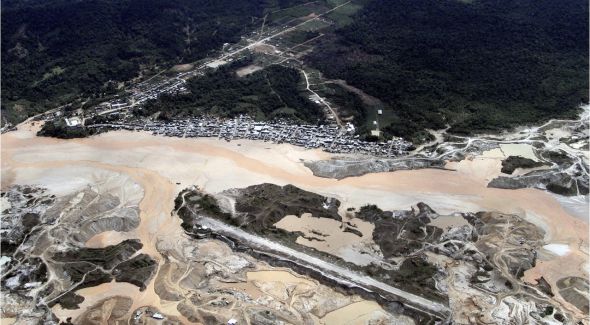
This photo would be better placed after Para. 26
A very interesting case of how the ethnographer has the responsibility to use names that do not bring harm to participants, even if it goes against the wishes of the participants. Names under consideration could be pseudonyms or legal names. Choosing a work mate’s real name as a pseudonym points to a major rift in the community that might be a topic of another piece. I’m not entirely convinced that Derrida’s beginning quote is the right choice.